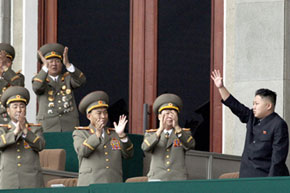 | ■ International
Same old story
老調重彈
Pyongyang rumblings have little effect on South Koreans
平壤的文攻武嚇對南韓人的動搖有限 |
| Outsiders might hear the opening notes of a war in the deluge of threats from North Korea, but to South Koreans it is a familiar drumbeat. Separated from the North by a heavily fortified border for decades, they have for the most part lived with tough talk from Pyongyang all their lives. | 對旁觀者來說,北韓一連串的威嚇或許聽來像是發動戰爭的前奏,但對南韓人來說那已經都是習以為常的老調。過去數十年來,兩韓之間只有一線重重防禦的邊界, 而南韓人大部份時間對北韓的強硬言詞都只是聽聽就罷了。 |
| Foreigners unused to North Korean rumblings have canceled trips to the Korean Peninsula. But to get South Koreans' attention, Pyongyang must compete with the economy, celebrity scandals and baseball games. At a restaurant in Seoul, owner Lee Chul-je said he wasn't worried about the threats. "North Korea does this all the time," the 65-year-old said. | 一些不習慣北韓文攻武嚇的外國人已經取消到朝鮮半島的行程。而為了得到南韓人的注意,平壤當局需要和經濟、明星八卦以及棒球有關的消息「競爭」。南韓一家餐廳的老闆李哲濟(音譯)表示 ,他對這類恫嚇並不感到擔心。六十五歲的他表示:「北韓常常都會這樣。」 |
| North Korea has responded with fury over United Nations sanctions following its third nuclear test on Feb. 12, and over joint U.S.-South Korean military exercises. Among other statements, it has threatened a nuclear strike against the U.S., declared that it has scrapped the Korean War armistice, blocked South Koreans from entering a jointly run industrial park and announced that it will restart a plutonium reactor and produce more fuel for nuclear bombs. | 北韓在二月十二日進行第三次核子試爆後,對聯合國通過制裁該國案子,以及美國與南韓的聯合軍事演習作出忿怒的回應。 除了其他聲明外,北韓更揚言要向美國發動核武攻擊,宣佈取消與南韓的停戰協定,阻止南韓員工進入兩韓的聯合工業園區,並表示將重啟一座鈽反應爐來生產更多核彈燃料。 |
| The litany of provocations has rocketed North Korea to among the top news headlines around the world, but not always in South Korea. When North Korea vowed to restart the reactor, South Korean dailies gave more space on their front pages to explaining the government's plans to give tax breaks to home buyers. | 北韓這一連串的挑撥言論在全球成為頭條新聞之一,但在南韓反而不一定如此。當北韓揚言將重啟反應爐時,南韓各家日報卻花更多的頭版版面在政府說明置產者的減稅計畫上。 |
| Kang Dong-wan, a cross-border relations expert at Dong-A University, said South Koreans see Pyongyang as crying wolf. "It only takes a week for South Koreans to get bored with threats, no matter how strong they are," Kang said. | 東亞大學的南北韓專家姜東萬(音譯)認為南韓人視平壞的言論為虛張聲勢。他表示:「無論北韓恫嚇的言詞多強硬,南韓人大約一週之後就會對此失去興趣。」 |
| South Korea's Defense Minister Kim Kwan-jin told lawmakers last week that North Korea's recent threats are mere rhetoric, although he did not rule out the chance of a small-scale conflict, such as North Korea's shelling of Yeonpyeong island near the border in 2010. That shelling killed four people. | 南韓國防部長金寬鎮上週向該國議員表示,雖然他不排除出現像二○一○年北韓對延坪島炮擊一樣的小規模衝突,北韓的威嚇只是紙上談兵。 那一次炮擊造成四人死亡。 |
| An important difference between now and 2010 is that Seoul has promised to respond aggressively to any North Korean attack. South Koreans are not oblivious about the North. They live with constant reminders that the country is technically in a state of war. All able-bodied men must serve in the military for two years. | 二○一○年與現在情勢的一個重大差別,就是現在首爾當局已表明將對任何來自北韓的攻擊作出強烈的回應。南韓人並不是無視北韓的存在。他們在生活中,一直都有兩韓理論上仍處於對戰狀態的認知。而所有身體無礙的南韓男性都得服役兩年。 |
| Cho Doo-hyeong, whose two sons both serve in the military, said he isn't too worried about their safety because he believes South Korean troops would prevail if war broke out. "I'm not anxious because I believe my country would win," the 52-year-old said. | 有兩名兒子正在服役的趙斗鉉表示,他並不太擔心兒子們的安危,因為他認為即使戰爭爆發,南韓軍隊也會獲得勝利。五十二歲的他表示:「我並不擔心,因為我相信我國一定是勝利的一方。」 |
沒有留言:
張貼留言